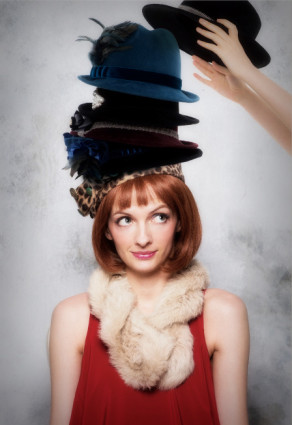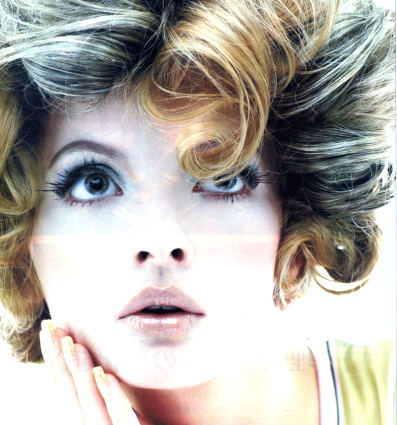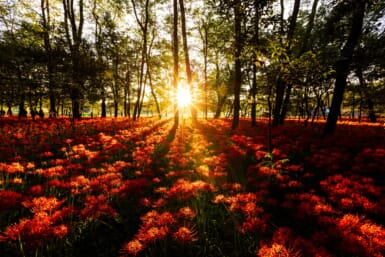Born in North Hollywood, California, in 1983, Ananda Jacobs moved to Japan in her early twenties. Since then she has worked as a teacher, model, actress, newspaper columnist, singer and composer. She’s appeared in a number of high-profile TV shows and movies, including “Massan” and “Thermae Romae.” Wanting to hear more about her experiences in this country, Weekender recently met up with the multi-talented young lady at a cafe in Ginza.
By Matthew Hernon
Firstly why Japan?
It was a fluke actually. I was on a poster advertisement for a hair salon in LA and the owner of that shop happened to be Japanese. She asked if I’d be interested in a two week modeling gig in Japan. I was feeling a bit stagnant in my career at that stage and while it wasn’t a country I’d ever thought about going to, I certainly wasn’t going to turn an opportunity like that down. We went to all these cities and I just loved it so I decided to stay on for a couple more months and then that turned into a few years.
How difficult was it to get modeling and acting jobs in those early days?
I started out teaching English, but my heart wasn’t really in it. I would go for auditions after classes and things just took off from there. I felt I wasn’t tall enough to work on the catwalk in LA, but here that isn’t as much of an issue. Some models want to focus entirely on photo shoots and not do any acting, whereas I was prepared to do silly commercials and things—I think that helped to open doors for me.
So you have worked on a few zany projects during your time here?
Yes I have. I’ve been a dancing squirrel, a mosquito, and a vampire, to name a few. I am currently appearing in an NHK English language show called “Ei Ei Go” where I play an android that shuts down if someone speaks incorrect English and recently in the final scene of an extended Pizza-La commercial, I won the romantic affections of a life-size pizza slice. My family and friends in the States are always interested to hear what strange character I will be playing next. It’s a lot of fun.
You’ve also been in a number of serious productions, including “Massan”; what was it like working with Charlotte Kate Fox?
I played her sister, but we were only in one flashback scene together so I didn’t interact with her too much. She seemed really bright, smiley and down-to-earth. As you’d expect she wasn’t used to the way things are done here so she was asking a lot of questions. It made me remember what it was like being a new person in Japan. I thought she did really well.
One of your recent roles was the main part for the stage production “Welcome Nippon.” What was it like appearing in front of a live audience in Japan?
I think it went well, but in my own mind I felt like I only just got by. Every day I was on the brink of a meltdown. I am comfortable in front of a camera, but that was my first time doing theater and most of it was in Japanese. I also had to learn the guitar for the part. It ran for two months and for that entire period I was completely focused on the role. I enjoyed that aspect of it—freelance work can be more stressful as there is so much uncertainty.
What other difficulties have you experienced in the entertainment industry here?
In terms of acting I would say the hardest thing has been finding deep, challenging roles—they are few and far between. It’s usually based on a photo selection which can be disappointing because they don’t care about the level of acting—It’s not about feeding an ego, I just want to feel I’m right for a project. I have days when I get sick of it, [but] then I realize this is how I make a living. I feel things have been picking up recently, with interesting roles in indie films, and new projects.
In terms of music, it has proved difficult to penetrate the live house circuit. We have no control over ticket prices, which are usually around 3,500 yen. When you don’t really have much of a fan base to begin with, it makes it difficult to attract large audiences. But I like to think of the last decade or so as one long audition—meaning that there were no wasted experiences, and everything that has led me to where I am now has had meaning. Hopefully I will end up in a position to fully express myself and grow as an artist. It has been challenging, but I am feeling positive about the future.
What would you say has been your biggest achievement since being in Japan?
I don’t feel like I’ve had huge success yet. I’m constantly dreaming of my music projects, so I think the only thing I can say for sure is that success, or what I truly would feel is the right kind of success for me, has yet to come. Of course I am grateful for the many jobs and experiences I’ve had thus far, but I feel it’s my job to go forward, as I’m far from satisfied.
What has surprised you about life in this country?
Despite its status as a first world nation I’m still taken aback by things I see and here in Japan, particularly concerning gender expectations. Even today there are a large number of people that think women should quit their job after getting married. People are often categorized here: “you are a woman so you must be like this, you are a foreigner so you must be like that.” It can be frustrating.
On a more positive note, I’ve been pleasantly surprised by the work ethic of people in this country. I’m not talking about salarymen working until midnight, but creative people who put their heart and soul into every project. They are so passionate, with no ego at all—I feel really lazy next to them!
What advice would you give to foreigners hoping to work in the entertainment industry in Japan?
Have fun with it and don’t take yourself too seriously. Assume you won’t get the job. It can be challenging and it might be a bit of a struggle getting the job you want, but Japan is really fast-paced and the next opportunity is always around the corner.
Finally, what one Japanese film has impressed you the most?
It’s difficult to pick out one film that has inspired me. When I first came to Japan I used to watch whatever old samurai movie was playing on TV at the time. Without understanding the words, I enjoyed absorbing the melodious and emphatic way the actors would speak, and I’m a sucker for old black and white films so I’d always choose those over the variety shows. Knowing Japanese now, I realize those period films use a type of Japanese that is not normally heard these days, especially in everyday speech … but that’s also lexically interesting to me.
For more information on Ananda Jacobs visit her website anandajacobs.com











